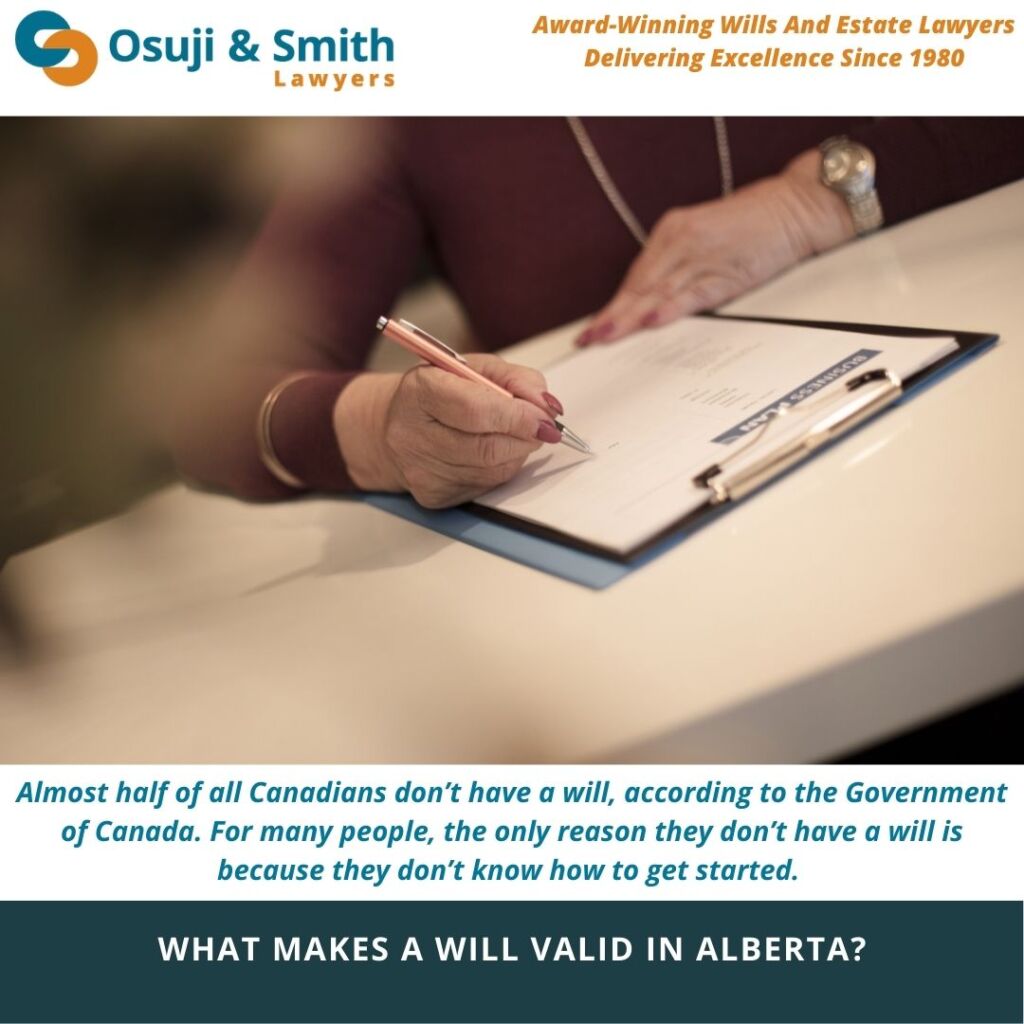What makes a will valid in Alberta?
Almost half of all Canadians don’t have a will, according to the Government of Canada. For many people, the only reason they don’t have a will is because they don’t know how to get started. This post covers the basics of a will in Alberta, including these common questions:
- What is a will?
- What happens if you die without a will?
- What makes a will valid in Alberta?
- Do I need a lawyer to make a valid will?
- What if my will is invalid or needs changes?
What is a will?
Your will is your “last will and testament”, a legal document that details your wishes after your death. It appoints an executor who will be responsible for finalizing your estate, and includes the distribution of your assets, such as property or money. Your will may also name a guardian for your children and describe your wishes for your funeral and burial.
What happens if you die without a will?

If you die without a will, the courts in Alberta appoint an executor for your estate and a guardian for your children. Your assets are distributed according to the Wills and Succession Act. It’s not as simple as it sounds, and can cause a tremendous amount of stress for your loved ones. Consider the following common scenarios:
- Your assets are frozen
- Your spouse and children must move out of the family home
- Your partner gets nothing
- The government gets involved in your children’s personal and financial lives
- Family feuds
- All your assets go to someone you barely know
None of these are desirable. Having a valid will can avoid all of these unfortunate situations.
What makes a will valid in Alberta?
To be valid in Alberta, a will must meet certain requirements.
Testator
You are the testator (or maker) of your will. You must make the will yourself. It cannot be made by someone else on your behalf, and you must be over 18 years of age and of sound mind. Your capacity to make a will can be questioned if you’re on strong medication, have a history of substance abuse, or are under extreme pain or pressure.
You can make a will if you’re under 18 if you:
- Are married
- Are a member of the armed forces
- Have the court’s approval
Witnesses
Your will must be properly witnessed by at least two valid witnesses. Both witnesses must see you sign the will at the same time, then they must each sign the will in the presence of you and the other witness. A witness cannot be a beneficiary of your estate.
Signatures
Unlike some other legal documents, your will does not have to be signed on every page—just the last page. However, it’s a good idea for you and your witnesses to initial each page. The last page must be signed by you, and your witnesses must sign it after you. Signatures must be in ink and a physical copy of your will must be kept. Nothing should be added to the will after it’s been signed.
Other Required Elements
In addition to the above requirements, a valid will in Alberta must also meet the following criteria:
- Required terms and proper wording, such as language that clearly gifts the assets to the beneficiary.
- No provisions may require a beneficiary to do anything illegal or attempt to control someone from “beyond the grave”.
- Distribution of assets must only include assets that you own.
Do I need a lawyer to make a valid will?
You can create your own will if it’s entirely in your own handwriting. There’s no need to use legal terms, but your handwritten will must clearly state that the document is intended to be your last will and testament, and you must sign and date it at the bottom. This is called a holograph will.
Fill-in-the-blank will kits, preprinted wills, partially typed wills, or other will packages are not recommended. Though a lawyer is not required to make a will valid in Alberta, these “template” wills are not always legally binding. It’s best to have a lawyer review your will to be sure.
Can a will be legally revoked in Alberta?
Major life events can affect your will and may automatically cancel or revoke your will—either in part or in whole. For example, if you named your spouse your executor, then get divorced, the appointment of executor will be revoked.
Your will is automatically revoked in the following 3 circumstances:
- You make another will.
- You make a written statement declaring your intention to revoke the will according to the Wills and Succession Act.
- You intentionally destroy the will (or have someone else do it) for the purpose of revoking it.
What if my will is invalid or needs changes?
If you need to make changes to your will, you can add a “codicil”. A codicil is an addition to your will that’s signed and witnessed just like the original will.
If your will is invalid because of issues of mental capacity or how the will was executed, a codicil can’t fix it. In those cases, you’ll have to make a new will.
Do you have a will?
Planning your estate and organizing your affairs is one of the best ways to take care of your family and your assets. The estate lawyers of Osuji & Smith can help you plan ahead. We can review your will to determine if it’s valid. And if you need to add a codicil or make a new will, we can guide you through every step.

